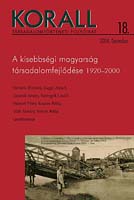Practical Thinking and Rigid Etatism, 1940–1944
Gyakorlati gondolkozásmód és megmerevedett etatizmus (1940–1944)
Author(s): Sándor OláhSubject(s): History
Published by: KORALL Társadalomtörténeti Egyesület
Keywords: social history; 20th century; Hungary; Hungarian minority; Romania; Transylvania; revision
Summary/Abstract: Following the euphoric weeks of the re-annexation, after the second Vienna decision in fall 1940 the Transylvanian territories re-annexed to post-Trianon soon began to experience conflicts and tensions both in the relationship between the state and society and among the various social groups as well. The paper takes the example of two Seckler counties – Csík and Udvarhely – to examine the development of the relationship between the state and the various groups of society, as well as between these groups themselves. In public discourse, the state featured as a personified entity: usually as an understanding, benevolent and charitable party, toward which society should be grateful. There was, however, another type of discourse in Transylvania: this regarded the relationship between the state and the organizations of society critically, criticized the extended authority of state institutions and emphasized the necessity of the independence of social organizations. A new phenomenon in the local societies of the Seckler region following the re-annexation was the tension between the „parachutists” coming from the parent country and the „natives”. The social basis of this tension was that such „parachutists” usually landed in better jobs and social positions, while the role of Transylvanian social organizations shrunk. The attitude of producer groups towards the state was fundamentally different from that of the state employees. The state interfered with the self-subsistent independence of such groups via the amendment of taxation rules, the regulation of produce prices and wages, thereby upsetting the traditions and customs of farming. The introduction of the new taxation rules gave rise to the most complaints. The administrative measures aimed at the establishment of wages did not harmonize with the traditional conditions of exchange in the region.
Journal: Korall - Társadalomtörténeti folyóirat
- Issue Year: 2004
- Issue No: 18
- Page Range: 98-112
- Page Count: 15
- Language: Hungarian

